Business
U.S. needs more tungsten. China is a major supplier of the critical metal

Pictured here is a stone with tungsten ore inside a mine in Germany run by Saxony Minerals and Exploration.
Picture Alliance | Picture Alliance | Getty Images
BEIJING — China dominates the supply chain for many of the world’s critical minerals, but so far it’s held off on sweeping restrictions on at least one: tungsten.
The metal is nearly as hard as diamond and has a high energy density. That’s made tungsten an important material in weapons, autos, electric car batteries, semiconductors and industrial cutting machines. Chipmakers such as Taiwan Semiconductor Manufacturing Company and Nvidia both use the metal.
“I don’t expect any saber-rattling over tungsten,” said Lewis Black, CEO of Canada-based Almonty Industries, which is spending at least $75 million to reopen a tungsten mine in South Korea later this year.
“If you get too belligerent about diversification, [it becomes a situation that’s] biting the hand that feeds you,” he said, adding that “tungsten has always been a diplomatic metal.”
While the Biden administration raised tariffs on imports of tungsten in May, China this past weekend did not include the metal in new regulations for boosting its oversight of domestic rare earths production.
But China might not be too concerned, because the Chinese government ignored the new tariffs… They completely ignored it because the Chinese don’t want tensions to rise.
Lewis Black
CEO of Almonty
“The tariffs were more of a warning shot, as Biden only put tariffs on three of the 25 strategic metals China exports,” Black said.
“But China might not be too concerned, because the Chinese government ignored the new tariffs, unlike in the past when they restricted some exports of rare earths. They completely ignored it because the Chinese don’t want tensions to rise.”
Asked last month if China would retaliate to the latest U.S. tariffs on tungsten, China’s Ministry of Commerce spokesperson He Yadong didn’t announce countermeasures. Instead, he called on the U.S. to remove the additional duties.
Commodity price reporting and analytics company Fastmarkets pointed out earlier this year that China has reduced national production quotas for its tungsten mines due to environmental restrictions.
Diversifying away from China
Still, Black expects his company to benefit from growing efforts to diversify away from China. Almonty claims the forthcoming mine in South Korea has the potential to produce 50% of the world’s ex-China tungsten supply.
Demand for non-Chinese tungsten is already on the rise.
“We see in the U.S., in Europe, they ask their suppliers for a China-free supply chain,” said Michael Dornhofer, founder of metals consulting firm Independent Supply Business Partner.

The U.S. REEShore Act — or Restoring Essential Energy and Security Holdings Onshore for Rare Earths Act of 2022 — prohibits the use of Chinese tungsten in military equipment starting in 2026, while the European Commission last year extended tariffs on imported Chinese tungsten carbide for another five years, Almonty Industries pointed out in a report.
The House Select Committee on the Strategic Competition between the United States and the Chinese Communist Party last month announced a new working group on the U.S. critical minerals policy.
Soaring tungsten prices
Expectations for higher demand and limited supplies of tungsten have pushed prices to multi-year highs, although they have tapered off in the last several weeks.
Dornhofer said in an interview in late May that he was also seeing Chinese buyers increasing their tungsten purchases.
“Since the beginning of this year, they are not only asking for Western concentrate, but they are buying significant volumes, paying even more than Western companies are willing to pay,” he said. “Definitely [going to be] a game changer.”
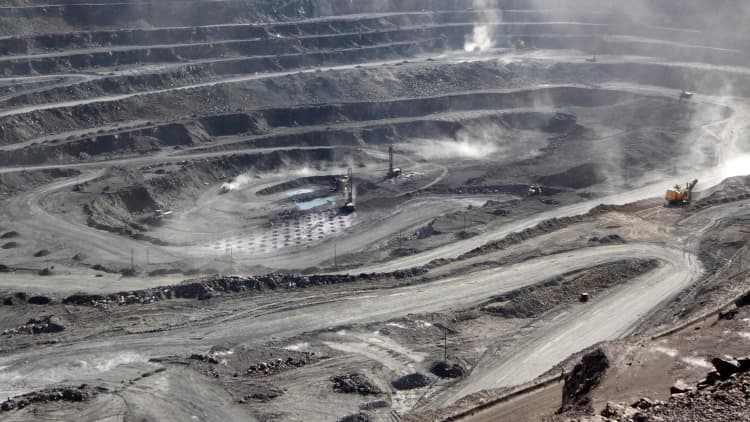
Back in January, U.S.-based research firm Macro Ops said: “We’re approaching an inflection point in tungsten supply. The US will quickly run out of stockpiled tungsten and flip from net seller to buyer over the next 12-18 months.”
The U.S. Bureau of Industry and Security at the Department of Commerce did not immediately respond to a CNBC request for comment on this story.
Brandon Beylo, head of investment research at Macro Ops, told CNBC in an email there are only six companies in the U.S. with capacity to produce tungsten. He added that the U.S. hasn’t produced tungsten domestically since 2015, meaning future U.S. supply must come from overseas.
He said the firm doesn’t own tungsten-related stocks, but that he’s personally looking for ways to access the physical commodity. There are no futures for trading tungsten.
Other tungsten players going to South Korea
China dominates over 80% of the tungsten supply chain, although local production costs are rising as the mines age, according to Argus, noting Chinese imports of the metal from North Korea, central Africa and Myanmar.
“This presents an opportunity for projects outside China,” Mark Seddon, principal, consulting and analytics at Argus, said in a June 28 webinar.
Other non-Chinese companies in the tungsten supply chain are going to South Korea.
In February, IMC Endmill, an affiliate of Warren Buffett-owned IMC Group, signed an agreement with the Daegu city government for a 130 billion Korean won ($93.6 million) investment in a tungsten powder manufacturing facility, according to a local news report.
IMC Group did not immediately respond to CNBC’s request for comment.
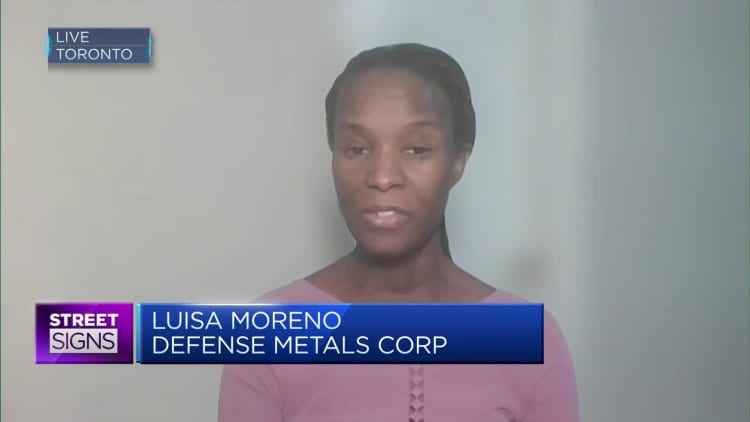
China’s dominance in global critical minerals supply chains has been built up over several decades.
Dornhofer pointed out that efforts to produce tungsten outside of China have languished for years, including plans for a mine in New Brunswick, Canada, that would have significantly increased global tungsten capacity.
All these projects have been on the table since 20 years ago, he said. “When people tell you in two years, three years they will be in operation, it’s a question of whether you believe them. On the other [hand], the tungsten is in the ground. It’s still there.”
Almonty claims to be the biggest producer of tungsten outside China and right now, primarily operates in Portugal and Spain. The forthcoming mine in Sangdong, South Korea, closed in the 1990s.
After the mine reopens later this year, Black expects his company will account for only 7% or 8% of global tungsten supply.
“We’re not crowding out any Chinese,” he said. “We don’t intend to.”
“Now if we’re going to produce 30% to 40%, I’m taking a battle with China, which wouldn’t be a smart thing to do.”
Business
Danish brewer Carlsberg to buy soft drinks maker Britvic

A can of Carlsberg AS pilsner and a Britvic Plc apple drink arranged in London, UK, on Friday, June 21, 2024.
Hollie Adams | Bloomberg | Getty Images
LONDON — Soft drinks maker Britvic has agreed to a sweetened takeover bid of £3.28 billion ($4.2 billion) from Carlsberg, the companies said Monday.
The deal agreed offered 1,290 pence per share for Britvic, with a small dividend that gives shareholders 1,315 pence per share.
Britvic in June refused an improved cash takeover bid from Carlsberg offering 1,250 pence per share of the British soft drinks maker. It said at the time that the proposal “significantly undervalues Britvic, and its current and future prospects.” Carlsberg’s previous June 6 offer price of 1,200 pence per Britvic share was also declined.
Ian Durant, the non-executive chair of Britvic, said the proposed deal “creates an enlarged international group that is well-placed to capture the growth opportunities in multiple drinks sectors.” He also namechecked Carlsberg’s agreement with PepsiCo which, he said, provides the “combined group with a strong platform for continued success.”
Carlsberg CEO Jacob Aarup-Andersen said in the same statement that the deal combines “Britvic’s high-quality soft drinks portfolio with Carlsberg’s strong beer portfolio and route-to-market capabilities, creating an enhanced proposition across the UK and markets in Western Europe.”
PepsiCo is key to the deal, as Britvic bottles and distributes PepsiCo brands in the U.K. and Ireland. Carlsberg and PepsiCo earlier this year agreed to waive a “change of control clause” in the bottling contract.
Business
‘We hope we don’t see a return to 1930s protectionism’

By Jonathan Josephs, Business reporter, BBC News
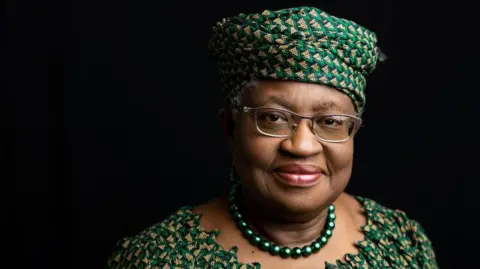 Getty Images
Getty ImagesGlobal trade “is not having the best of times at the moment”.
That is the admission of the director general of the World Trade Organization (WTO), Dr Ngozi Okonjo-Iweala. “We are seeing increasing protectionism, some undermining of the WTO rules, and some of this is leading to fragmentation,” she tells the BBC.
“Global trade is really part of the lifeblood for making countries resilient – and also for underpinning growth, so we are concerned about that.”
In recent weeks and months these fragmentations have come to the fore with the EU imposing provisional tariffs of up to 37.4% on imports of Chinese electric vehicles (EVs). It followed after the US in May introduced 100% tariffs on Chinese EVs.
Both Brussels and Washington accuse the Chinese government of unfairly subsidising its EV sector, allowing producers to export cars at unfairly low prices, and threatening jobs in the West.
President Biden has also increased import taxes on a range of other Chinese products that he said formed “the industries of the future”. These include EV batteries and the minerals they contain, the cells needed to make solar panels, and computer chips.
Meanwhile, the US has been pouring billions of dollars of government money into green technology, through its Inflation Reduction Act, which aims to reduce a reliance on Chinese imports.
EU trade commissioner Valdis Dombrovskis tells the BBC that Europe does not want to close the market for EVs. “We welcome imports, we welcome competition, but this competition must be fair,” she says.
Last year, the volume of global trade fell for just the third time in 30 years, according to the WTO. It says the 1.2% decline was linked to higher inflation and interest rates, and is forecasting a recovery this year.
However those factors have their roots in events that are continuing to fundamentally reshape the global economy, the International Monetary Fund’s (IMF’s) first deputy managing director Gita Gopinath explained in a recent speech.
“What we’ve seen in the last few years, I would say, especially when it comes to global trade relations, is nothing like we’ve seen since the end of the Cold War.”
“The last few years, you’ve had numerous shocks, including the pandemic. We had Russia’s invasion of Ukraine, and following these events, increasingly, countries around the world are guided by economic security, and national security concerns, in determining who they trade with and who they invest in,” she said.
That’s affecting countries as far apart as Peru, Ghana and Vietnam as they increasingly find themselves having to choose between strengthening economic ties with the western powers, or a China-Russia axis.
“We’re also concerned about the emerging fragmentation that we see in the trade data,” says the WTO’s Dr Okonjo-Iweala. “We’re seeing that trade between like-minded blocks is growing faster than trade across such blocks.”
She warns that “it will be costly for the world” to continue down this path. WTO research has estimated that price at 5% of the global economy, whilst the IMF has suggested it could be nearer to 7% or $7.4tn (£5.8tn) of lost output in the long run.
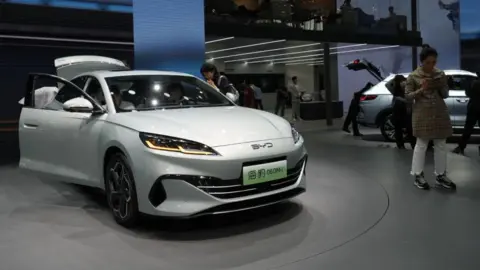 Getty Images
Getty ImagesThe EU’s introduction of tariffs on Chinese-made EVs follows a surge in their exports to Europe over the last few years. Exports jumped from $1.6bn in value in 2020 to $11.5bn last year, according to one study, which said they now made up 37% of all EV imports into the EU.
BYD, Geely and SAIC are some of the Chinese EV makers said to have benefitted from billions of dollars worth of government help.
After many years of support Chinese EV companies no longer need that help, says Jens Eskelund, president of the European Union Chamber of Commerce in China. “They are today simply very competitive on their own terms. I think the introduction of tariffs is a symptom that something is out of balance.”
When it comes to broader relationship, Mr Eskelund says it’s “mind boggling” that since 2017 the volume of goods that the EU has sold to China has fallen about a third, even though China’s economy has been growing steadily.
Citing Chinese restrictions around market access for overseas firms, and tough security regulations, he adds: “I think it’s fair to say that that Europe still remains a significantly more open market to Chinese companies, then the other way around. And that is obviously something that needs to change.”
The chamber’s recent survey showed that members have the lowest confidence on record for investing in China.
It comes as the EU is trying to lower its economic dependence on China. European Commission President Ursula von der Leyen last year described the need to “de-risk not de-couple” its relations with China.
Brussels’ concerns include Beijing using sensitive technology for military purposes, and its support for Russia as it continues its offensive in Ukraine.
Companies including Ikea, Nike and Apple are also trying to become less reliant on China.
Whilst the EU and China are set to hold talks about the potential EV tariffs, Chinese state media has reported that retaliatory measures are being considered on EU goods including pork, cognac and luxury cars.
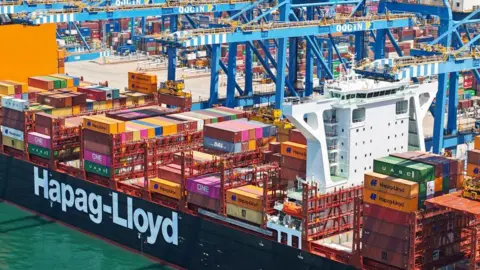 Getty Images
Getty ImagesHowever, there are other barriers for global trade to overcome, including in two of the most important arteries for moving goods around the world.
This year Panama Canal officials had to reduce the number of ships allowed to traverse the waterway. This is due to a lack of rainfall to fill the lake that feeds the canal.
Meanwhile, the Suez Canal is effectively cut off because of ongoing attacks on commercial ships by Houthi rebels in the Red Sea. Traffic through the canal is down 90%, according to logistics firm Kuehne+Nagel.
Rolf Habben Jansen, chief executive of the German shipping giant Hapag-Lloyd, says this disruption means that the rates his firm charges are up between 30% and 40%.
Whilst shipping costs are a small part of retail prices, Mr Habben Jansen says “these extra costs in the end get passed on” to consumers. That could end up pushing inflation up just as central banks are showing signs of getting it under control.
That would be “detrimental to consumers,” says the WTO’s Dr Okonjo-Iweala.
Despite all the tensions, she says trade has shown signs of resilience, and she adds that her organization can help countries solve their differences.
Meanwhile, Dr Okonjo-Iweala admits that some WTO rules will need to change to help meet the challenge of climate change. “I strongly believe that some of our [global trade] rules, we do need to look at them,” she says.
“When they were put in place, decades ago, we were not confronting the kind of climate change threats we confront today.”
Regarding the increased use of tariffs, she adds: “We hope we don’t have a repeat of what we saw in the 1930s. We had retaliatory tariffs, and it was downhill from there and everyone lost.
“So I do hope we will not enter into that kind of era again”.
Business
Biden seeks boost in Pennsylvania as calls for him to step aside mount By Reuters

By Andrea Shalal
HARRISBURG, Pennsylvania (Reuters) – An embattled U.S. President Joe Biden faced escalating pressure from fellow Democrats worried about his candidacy on Sunday, concerns he worked to ease with campaign stops in the battleground state of Pennsylvania.
Biden, 81, faces growing calls to end his reelection bid after a halting performance in a June 27 debate with Republican Donald Trump, 78, raised questions about his ability to do the job for another four years. He has vowed to stay in the race, dismissing calls for him to drop out as “nonsense” in a fundraising email on Saturday.
On Sunday, the Democratic president received a warm welcome at a Black church in Philadelphia and later traveled to the Pennsylvania state capital, Harrisburg, for an event with union members. Black voters are a critical part of Biden’s base of support and recent public opinion polling has shown their support for him softening.
On a leadership call on Sunday called by House Democratic Leader Hakeem Jeffries, some House Democrats said that Biden should step aside as presidential candidate, a source familiar with the discussions told Reuters.
Representatives Jerrold Nadler, Adam Smith, Mark Takano and Joe Morelle, senior House Democrats who sit on the Judiciary, Armed Services, Veterans Affairs and House Administration committees, were among those who called on Biden to step aside, according to media reports.
Democrats also suggested that Vice President Kamala Harris, seen as the likeliest candidate to replace Biden in the Nov. 5 election were he to bow out, could perform well.
The coming week is crucial, Democratic Senator Chris Murphy said on CNN’s “State of the Union.” He encouraged the president to hold a town hall or news conference to convince voters he is “the old Joe Biden.”
“The president needs to do more,” Murphy said. “I do think the clock is ticking.”
Democratic U.S. Representative Adam Schiff said on NBC’s “Meet the Press” that Biden needs to move swiftly to put concerns to rest.
He added that he believed Harris “could win overwhelmingly, but before we get into a decision about who else it should be, the president needs to make a decision about whether it’s him.”
Asked in Harrisburg whether the Democratic Party was behind him, Biden told reporters “yes.”
‘NEVER COUNT JOSEPH OUT’
In Philadelphia, churchgoers at the Mt Airy Church of God in Christ gave Biden a rousing welcome. Bishop Louis Felton praised him as “a man of vision and integrity.”
The bishop, referring to Biden’s Republican challenger without naming him, chided those who “make an issue of the president – that he is conditioned with stammering and not being able at certain times to bring forth words – while another person lies fluidly and you never challenge his lies.”
“Never count Joseph out,” Felton thundered. “Go, Joseph, you can make it.”
Biden addressed the congregation for a little more than six minutes, saying, “We must unite America again. That’s what I’m going to do.”
Carla Greene, a resident of Philadelphia, said she hoped Biden felt the support, adding, “we believe he is the man for the job.”
In a Friday interview with ABC News, Biden said only the “Lord Almighty” could persuade him to drop out, dismissing the prospect that Democratic leaders could join forces to try to talk him into standing down.
A Democratic National Committee member from Florida, Alan Clendenin, joined calls urging Biden to step aside on Sunday.
“Joe Biden will be remembered by historians as one of the finest presidents in American history, but this election is about the next four years, not the last three and a half,” Clendenin said.
The DNC has steadfastly supported Biden since his debate stumbles so any defections could suggest a deepening of the crisis. DNC Chair Jaime Harrison said on Sunday that Biden remains the party’s nominee. “The primary is over,” he said.
CRITICAL STATE
Biden stopped at a local campaign headquarters after church, telling supporters there, “Pennsylvania is a critically important state.”
Accompanying Biden, Democratic Senator John Fetterman bellowed, “There is only one person in the country that’s ever kicked Trump’s ass in an election and that is your president.”
Biden also met briefly with Pennsylvania’s Democratic Governor Josh Shapiro.
Pennsylvania is one of the half dozen or so states alongside Wisconsin and Michigan that can swing Democratic or Republican and are expected to determine the outcome of what has been a tight race.
Sunday’s trip – Biden’s 10th to Pennsylvania during the 2024 election campaign – is part of a July voter outreach blitz by the Democratic Party that includes a $50 million media campaign aimed at events, such as the Olympics, and travel by the president, the first lady, Harris and her husband to multiple battleground states.
Pressure from Congress is expected to ramp up in the coming days as lawmakers return to Washington from a holiday recess and donors mull their willingness to keep funding Biden’s campaign.
Biden is also preparing to host dozens of world leaders at a NATO summit in Washington this week and hold a rare solo news conference.
Five U.S. lawmakers have publicly called for Biden to end his reelection bid, including Representative Angie Craig of Minnesota, the first Democratic member of the House of Representatives from a battleground district, with others said to be poised to join in.
Two letters are circulating among House Democrats calling for Biden to step aside, House Democratic sources have said.
U.S. Senator Mark Warner of Virginia invited fellow senators to a meeting on Monday to discuss Biden’s campaign.
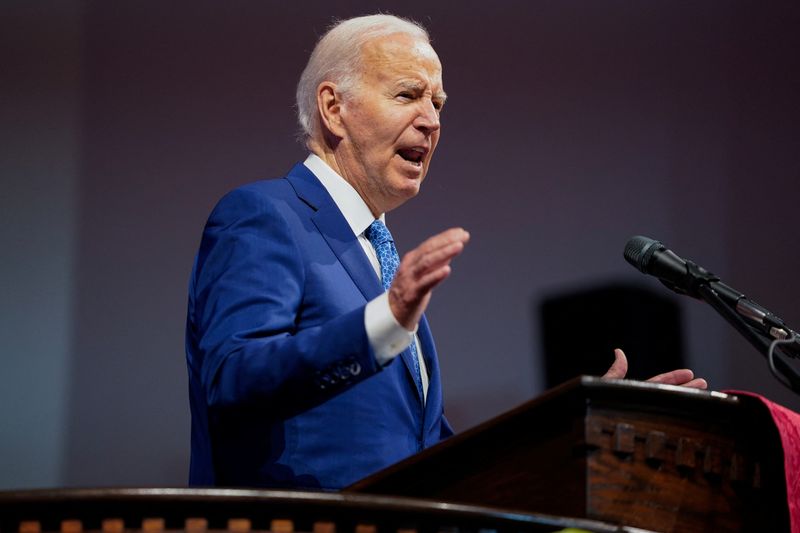
Senator Bernie Sanders, 82, who has run for the Democratic nomination for president in the past, stood firmly in Biden’s camp on Sunday, saying Democrats’ focus should be on policy.
“This is not a beauty contest,” he said on CBS’ “Face the Nation.”
-

 African History5 years ago
African History5 years agoA Closer Look: Afro-Mexicans 🇲🇽
-

 African History5 months ago
African History5 months agoBlack History Facts I had to Learn on My Own pt.6 📜
-

 African History5 years ago
African History5 years agoA Closer Look: Afro-Mexicans 🇲🇽
-

 African History1 year ago
African History1 year agoMajor African Tribes taken away during the Atlantic Slave Trade🌍 #slavetrade #africanamericanhistory
-

 African History1 year ago
African History1 year agoCameroon 🇨🇲 World Cup History (1962-2022) #football #realmadrid #shorts
-

 African History5 months ago
African History5 months agoBlack History Inventors: Mary Kenner 🩸
-

 African History1 year ago
African History1 year agoPROOF AFRICAN AMERICANS AIN'T FROM AFRICA DOCUMENTED EVIDENCE
-

 African History1 year ago
African History1 year agoNo African pre-Columbus DNA? 🤯🤯 #history #mesoamerica #mexico #african



































